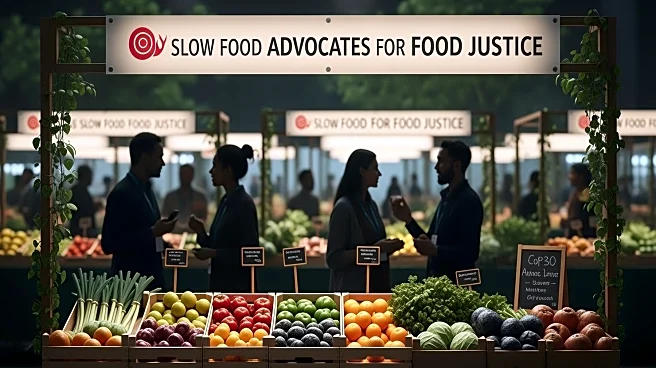What's Happening?
Slow Food, an international organization promoting sustainable food systems, has called for food justice to be prioritized in climate policy discussions at COP30. On World Food Day, Slow Food emphasized
the universal right to food, highlighting that 2.6 billion people currently cannot afford a healthy diet. The organization argues that food systems are both contributors to and victims of the climate crisis, but they also hold potential solutions. Slow Food urges world leaders to integrate food systems into climate action plans, advocating for agroecology and equitable food systems as part of national climate plans. The organization stresses the need for concrete actions and incentives to transition to sustainable food practices.
Why It's Important?
The call to prioritize food justice in climate policy is significant as it addresses the intersection of food security and environmental sustainability. By focusing on agroecology and equitable food systems, Slow Food aims to transform global food systems to mitigate climate impacts. This approach could help prevent the world from exceeding the 1.5°C temperature increase limit set by the Paris Agreement. The emphasis on food systems in climate action plans could lead to improved food security, reduced biodiversity loss, and enhanced soil health. The initiative also highlights the need for substantial financial resources to support sustainable practices, particularly in the Global South, which could drive global efforts to combat climate change.
What's Next?
COP30 is expected to move beyond symbolic agreements and deliver tangible actions to support the transition to sustainable food systems. Updated national climate plans should include measurable targets and adequate funding to address food production, consumption, and loss. Slow Food advocates for the Baku-to-Belém roadmap to mobilize $1.3 trillion annually by 2035, ensuring financial flows support farmers and ecosystems. The organization calls for empowering communities to reclaim their right to define food production and consumption, which could lead to increased climate resilience. The outcomes of COP30 could set a precedent for integrating food systems into global climate strategies.
Beyond the Headlines
The push for food justice at COP30 highlights ethical considerations in climate policy, emphasizing the need for multilateralism and community empowerment. By addressing the climate finance gap, Slow Food aims to ensure that financial resources support sustainable practices rather than undermine them. This approach could lead to long-term shifts in global food systems, promoting equity and sustainability. The focus on agroecology and equitable food systems also underscores the cultural dimensions of food production and consumption, advocating for a holistic approach to climate resilience.









